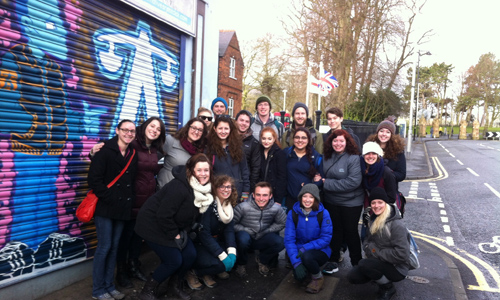Ohio University students can apply now for the M.A. in Law, Justice & Culture program and start their graduate studies in the spring, taking graduate courses and getting a jump start on a one-year master’s degree.
Senior undergraduates who are accepted into the master’s program are, under certain circumstances, invited to begin the degree early by taking graduate courses for graduate credit in the spring semester.
This option applies to any qualifying Ohio University student with senior status (at least 90 earned undergraduate hours), for up to three courses (12 credit hours).
Students must have been accepted into the M.A. program by the end of fall semester to take graduate courses in the spring.
To qualify to take graduate courses as an undergraduate student, students must have an accumulative undergraduate GPA of at least 3.2. Students also must complete a special form available from the program director, Dr. Haley Duschinski, and the Graduate College.
After completing the undergraduate degree, students transition into the M.A. program, completing the master’s degree in just one year of full-time graduate study.
About the M.A. in Law, Justice & Culture
The M.A. in Law, Justice & Culture focuses on critical analysis of law in relation to society, culture, politics and power. This master’s degree is designed for anyone who deals with law academically or professionally—including individuals in careers that deal with law, as well as those considering law school or Ph.D. programs.
The M.A. in Law, Justice & Culture:
- Can be completed in person on campus or entirely online.
- Offers research-driven teaching by faculty with national and global expertise in their fields.
- Strengthens skills in analytical and conceptual thinking, legal and scholarly research and writing, ethical and public interest concerns, public advocacy, and active engagement with the challenges of law and justice in the 21st century.
Learn more about recent graduates from the M.A. program in Law, Justice & Culture.
Why Study Law and Society?
“Law and society is a vibrant interdisciplinary field,” says Duschinski, associate professor of anthropology. “As a law and society degree, the new M.A. program draws on the analytic, interpretive and imaginative tools of the liberal arts to shed light on the moral and political elements on law, and its meaning and significance in our everyday lives,” she says.
The program emphasizes research-driven teaching and learning. All students must carry out graduate-level independent research by completing either a master’s thesis or a master’s research essay, with the option of a capstone research course. The program also provides professional training in academic presentation and communication through its curricular and extra-curricular components.
Core courses focus on the theoretical traditions of law and society scholarship and the deep integration of theory and methods in this interdisciplinary field, while elective courses examine law from different disciplinary perspectives.
The program also offers an annual nine-day study abroad program focusing on human rights, law and justice in post-conflict Northern Ireland. This study abroad experience includes interactions with former combatants, human rights lawyers, ex-political prisoners, victims’ associations, and restorative justice practitioners, as well as visits to museums, former prisons, and non-governmental organizations.
- Learn more about the CLJC study abroad program on Human Rights, Law and Justice in Northern Ireland. (The Northern Ireland program is expected to resume in spring 2023.)
Vibrant Center for Law, Justice & Culture
The degree is housed within Ohio University’s Center for Law, Justice & Culture, an interdisciplinary teaching and research center focusing on law in relation to the social and political challenges of the 21st century.
“The center is an energetic community of students and faculty who are deeply committed to the study of law’s role in our contemporary world. We coordinate socio-legal studies at Ohio University,” Duschinski said.
The center supports academic training in law and society through interdisciplinary coursework and research as well as extra-curricular academic and professional development opportunities, including pre-law advising and programming. It brings together perspectives from African American studies, anthropology, criminology, history, political science, sociology, and other related fields.
The center’s faculty are leading researchers with national and global expertise on diverse forms of law in contemporary, historical and comparative contexts.
“We carry out empirical research on legal actors and institutions, rights claims and struggles for justice, the relationship between social movements and legal mobilizations, alternative jurisdictional and legal orders, and law’s coercive power and emancipatory potential,” Duschinski added.
Duschinski serves as the academic adviser for students in the M.A. program, and CLJC Pre-Law Advisor Larry Hayman provides dedicated advising on preparing for law school, applying to law school, and pursing law-related careers.
Benefits of the M.A. in Law, Justice & Culture
Individuals who have recently completed their undergraduate training with little professional experience may develop their academic and professional training by earning the M.A. in Law, Justice & Culture. The degree is ideal for individuals considering a law school or a Ph.D. program.
For recent college graduates, the on-campus master’s degree option provides one year of graduate-level training in socio-legal theory, methods, research, and writing prior to applying to law school, doctoral programs, or starting their career in research and policy, public agencies, advocacy organizations, private companies, and nonprofits.
- Learn more about former M.A. student Aliyah Cole.
- Learn more about former M.A. student Devin Ordich—and how she has used her degree to advance her law career.
- Learn more about former M.A. student Samantha Rommel.
- Learn more about former M.A. student Gillian Amrine—and how she has used her M.A. degree to advance her career in child welfare.
- Learn more about our recent graduates from the M.A. program in Law, Justice & Culture
Fore more information, contact Duschinski at duschins@ohio.edu) or Hayman at hayman@ohio.edu.





















Comments